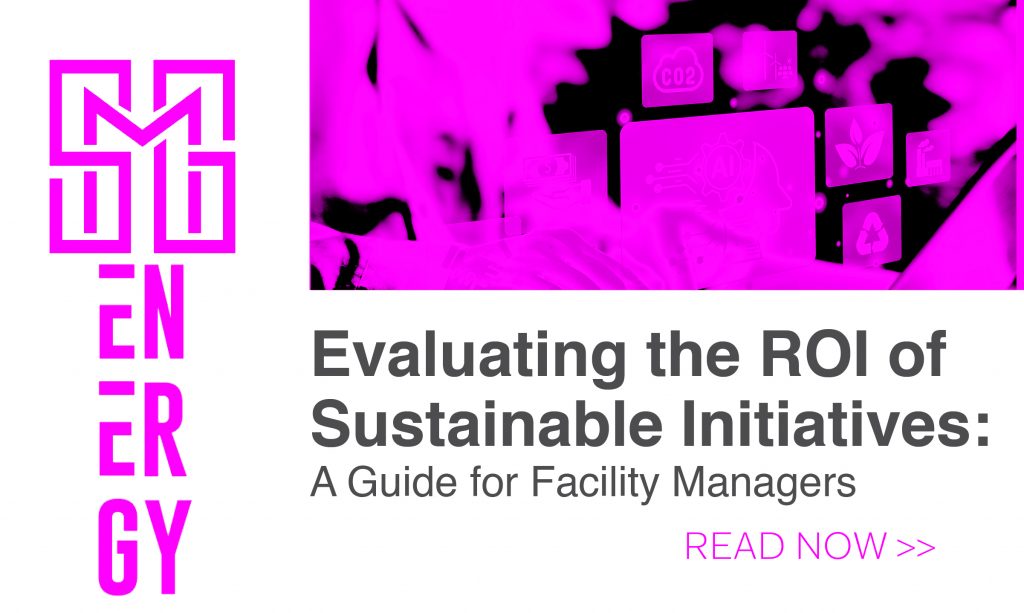As businesses scale, the strategic importance of managing energy across multiple sites often gets overshadowed. However, amid rising energy costs and a global pivot towards sustainability, effective business energy management is not optional but rather a critical need.
This piece distills the core practices to boost efficiency and lower costs, highlighting the role of structured energy management systems and business intelligence. We’ll explore the impact of energy audits, the benefits of efficiency measures, the potential of renewable energy, and the power of demand response programs. We’ll also discuss the importance of fostering an energy-conscious culture and the value a trusted partner like SMG Energy can provide.
Effective Business Energy Management: Easier Said Than Done
While most businesses understand the importance of sustainable practices, implementing effective business energy management can often bring challenges that seem insurmountable. However, with the right strategy and resources, businesses can navigate these challenges, reaping the benefits of energy efficiency.
The Quest for Actionable Data
Implementing effective business energy management is a challenging journey, and acquiring actionable data is often the highest mountain to climb.
One of the challenges is data silos. It’s common for businesses to have data scattered across multiple systems, hindering a complete understanding of energy usage. Coupled with potential data quality issues, decisions based on incomplete or inaccurate data can be far from optimal.
Moreover, the difficulty of analyzing vast amounts of data to spot trends and patterns can be overwhelming. In other words, even if the data is available, costs associated with collecting, storing, and analyzing it might be prohibitive.
Nevertheless, by setting appropriate key performance indicators (KPIs) from the outset, businesses can harness data-driven insights to monitor progress and establish realistic sustainability goals effectively, thus enhancing their business energy management.
Pursuing Holistic Efficiency
Holistic efficiency in business energy management is an arduous undertaking. Integrating factors like energy types, equipment efficiency, employee behaviors, and energy costs into a single plan can be overwhelming. Moreover, initial expenses may be daunting, even though the promise of long-term energy savings is significant.
Yet, despite these challenges, achieving holistic efficiency remains an essential endeavor for businesses aiming to trim their energy costs and boost their environmental footprint. Partnering with expert firms can offer much-needed guidance and strategic adjustments, enabling companies to overcome these obstacles, effectively manage energy, and focus on their core operations.
Balancing Employee Workloads
Balancing employee workloads can be challenging when striving for effective business energy management. Integrating sustainability practices into regular operations makes this task even more complicated, putting pressure on facility professionals. Individual employee capabilities, changing business priorities, and fluctuating resources further compound this issue.
However, this hurdle is manageable. Engaging seasoned industry experts is a strategic approach that businesses can adopt. These consultants provide valuable guidance, helping companies to navigate their path toward energy management objectives. In addition, their assistance ensures energy savings optimization and a robust enhancement of ESG metrics without overwhelming the team members and tipping the workload balance.
Understanding Incentive Programs
The complexity of incentive programs often presents a significant hurdle in effective business energy management. With increasing programs offering potential savings, understanding their varied terms and conditions can be overwhelming for businesses. In addition, the intricacies of these schemes often include demanding paperwork, making it tough to determine eligibility and potential savings.
However, this challenge is not impossible. With strategic help from expert external consultants, businesses can make sense of the complex landscape of incentive programs. By guiding firms through the daunting process, these consultants ensure that companies can leverage these schemes effectively, leading to significant energy savings and justifying sustainability on a cost basis.
Formulating a Cohesive Strategy
Developing a cohesive business energy management strategy presents multifaceted challenges which can result in a fragmented approach. These challenges often stem from a need for more data, resources, expertise, or commitment, hindering informed decision-making, practical implementation, and enduring change.
Moreover, smaller businesses or those with financial constraints may find it particularly taxing to allocate sufficient resources. At the same time, specialized knowledge can increase costs, while a lack of commitment from senior management can hinder energy-saving efforts.
At this junction, an expertly-guided business energy management system proves invaluable, bridging gaps and ensuring a unified approach to sustainability.
Best Practices for Business Energy Management
Transitioning to energy-efficient operations across multiple sites can be an intricate business process. However, by following these tips and best practices, enterprises can ensure that their energy efficiency scales with their operations.
Be Diligent With Data
For optimal business energy management, diligent data handling, bolstered by comprehensive energy audits, is pivotal. It uncovers potential energy-saving areas, helping businesses make informed decisions that lead to energy reduction.
Businesses can identify peak energy consumption times by analyzing their energy usage data. Doing so enables them to adjust schedules and implement energy-saving measures such as turning off lights when not in use. Furthermore, analyzing energy data makes it possible to identify equipment that consumes too much energy and replace it with more energy-efficient options.
However, the usefulness of data extends beyond identifying improvement areas. It also measures progress, tracking the impact of energy-efficiency initiatives. This valuable feedback allows businesses to adjust strategies as needed, ensuring maximum return on energy investments.
Adopting a Holistic Approach
Implementing a holistic strategy is paramount for successful business energy management. Businesses can pinpoint areas of inefficiency by considering every aspect of energy consumption, including its production, distribution, and utilization.
Commencing with a comprehensive energy audit is a smart move. This assessment identifies wastage and provides insights into potential efficiency enhancements. Post-audit, businesses should roll out initiatives targeted at energy conservation, such as upgrading to energy-efficient lighting or revamping HVAC systems.
Another critical element of this holistic strategy is fostering an energy-conscious employee culture. Businesses can further bolster their energy management efforts by educating staff about energy efficiency and incentivizing energy-saving behaviors.
Understand Your Demand
Understanding energy demand is a cornerstone of effective business energy management, paving the way for effective demand response programs while uncovering significant savings opportunities.
To better understand your monthly energy consumption, dissect your utility bills and consider deploying real-time tracking with demand-monitoring devices. These tools spotlight high-consumption areas and reveal inefficient operations or equipment.
With these insights, you can implement efficiency measures, such as upgrading to energy-efficient appliances, encouraging employees to conserve energy, and employing demand-side management programs. These strategies help control peak consumption, ensuring considerable cost savings.
Invest in Renewables
Incorporating renewable energy into business energy management is vital for environmental sustainability and economic resilience. With the increasing affordability of renewables, like solar and wind, businesses can reduce their carbon footprint and protect against volatile traditional energy costs.
One effective way businesses can embrace renewable energy is through solar panel installation, providing direct clean power access, promoting sustainability, and yielding financial returns while boosting environmental stewardship.
Alternatively, businesses can support green energy indirectly via Renewable Energy Credits (RECs). These credits contribute to renewable projects by representing the generation of one megawatt-hour of electricity from renewable sources, all without requiring individual system installations.
Prioritize Performance Tracking
In business energy management, performance tracking is vital, providing insights for strategic planning. By setting benchmarks and monitoring progress, businesses can uncover wasteful practices, enabling adjustments that reduce consumption, cut costs, and enhance environmental sustainability.
Different tracking methods are available, from direct metering to software that collates data across multiple sources. This gathered information can uncover trends and highlight areas for optimization.
With these insights, businesses can devise and implement strategic changes. Options include appropriate energy-efficient equipment, adjusting lighting, or improving insulation. These steps can markedly cut energy consumption and result in significant savings, demonstrating the power of prioritizing performance tracking in business energy management.
Partner With the Experts
As businesses expand across multiple sites, partnerships with energy management experts can streamline sustainable growth. In addition, these alliances help minimize costs by identifying potential savings while reducing environmental footprints, enhancing efficiency, and tailoring strategies.
Moreover, staying at the forefront of energy-efficient technologies and trends is another significant advantage these experts offer. Keeping businesses abreast of the latest developments ensures companies remain on the cutting edge of efficient operations. In this way, expert collaboration becomes an invaluable asset for businesses aiming for optimal energy management.
For a Customized Energy Solution for Your Multi-Site Business, Turn to SMG Energy Today.
Whether recognizing the value of a data-driven approach, comprehensively understanding energy demand, or integrating renewable sources, all contribute to helping companies succeed in the complex arena of business energy management. In addition, energy audits, efficiency measures, demand response programs, and renewable energy integration also play pivotal roles.
In this area, SMG Energy is a trusted partner. With tailored energy management solutions, including utility management, energy procurement, and energy efficiency, companies that partner with SMG Energy have all they need to enhance sustainability while optimizing energy usage and reducing costs. Furthermore, extending services to ESG, rebates, and incentives solidify your green commitment and provide financial benefits, paving the way for sustainable growth across multiple sites.
Don’t wait to start your energy optimization journey. Reach out to SMG Energy today for a free energy assessment, and begin harnessing the benefits of efficient business energy management.





